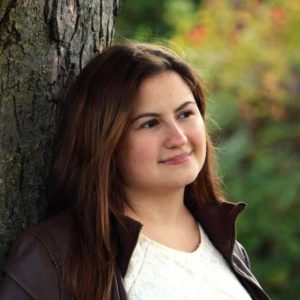- Calls to this hotline are currently being directed to Within Health or Eating Disorder Solutions
- Representatives are standing by 24/7 to help answer your questions
- All calls are confidential and HIPAA compliant
- There is no obligation or cost to call
- Eating Disorder Hope does not receive any commissions or fees dependent upon which provider you select
- Additional treatment providers are located on our directory or samhsa.gov
Be Your Best Advocate

Raya Lasiewski, Timberline Knolls Recovery Alumna
Have you ever woken up one day thinking, “today I will have an eating disorder?” You probably haven’t. Many people who don’t have an eating disorder don’t understand. We don’t choose to have an eating disorder. However, we can choose recovery.
I was 16 years old when I started struggling with what I thought was a diet. I would restrict and follow the “normal rules” of a diet. When weeks passed, it no longer seemed to be a diet.
My behaviors looked more like an eating disorder. I started having mind fog and irritability. I honestly thought the whole world was against me. I mean, I had “control” – why would my school say things to me about how I was eating?
My 17th birthday was when I realized I had an eating disorder. I was supposed to be enjoying my birthday, but I couldn’t handle the sight of food, and I wanted to leave. After that moment, I have tried to understand for myself and my family. I had been in and out of therapy until I went to my first treatment center.
I didn’t start my recovery journey until I was a junior in college. My university had to do an intervention. That’s when I really realized that my eating disorder was truly a problem.
My school told me if I “didn’t go to treatment now, [I wouldn’t] make it the to winter semester.” That was my rock bottom. My hopes of graduating and being a social worker were slipping away. It was a hard thing to hear. My friend, “ED,” was destroying my life.
I made the brave decision to go to Timberline Knolls. I knew I truly belonged there when I couldn’t handle the first meal without crying. I didn’t realize my past trauma had something to do with my eating disorder.
Research has shown trauma can be a risk factor for developing an eating disorder. When I made the realization that my past trauma had something to with my eating disorder, I started sharing what happened.
The responses I got were “what did you wear”, “why didn’t you just leave”. “You’re making that up”, “You’re attention seeking”. Hearing all of this made me feel even worse as a person. I knew these statements weren’t true, but sometimes your emotions take over.
I have learned that sometimes you have to be your own advocate for what you need in recovery. Some people won’t understand what you’re going through, and you just have to learn to accept it, as hard as that can be.
The only person that knows what is best for you is yourself. It’s your story, and you get to write it. Over multiple attempts of trying to educate my parents on my eating disorder, I had to learn to become resourceful.
I knew I wanted a life without my eating disorder, so I never gave up hope on trying to get the treatment I needed, even if it meant reaching out to different organizations that could help me cover my care.
One thing I have learned is, “don’t try to get milk from a hardware store.” That expression meant to me that you don’t go to people you know won’t understand your mental health. I never gave up on trying to seek help.
My recovery has had its ups and downs. Throughout my recovery journey, I had to find people that understood what I was going through. I was so tired of trying to educate my parents and friends when they never seemed to understand why I can’t just “get over it.”
I didn’t choose to have an eating disorder, but I did choose recovery. My recovery has brought me so much passion for eating disorder awareness and the mental health field.
About Our Sponsor:
At Timberline Knolls Residential Treatment Center outside of Chicago, Illinois, we provide specialized care for women and adolescent girls who are living with eating disorders.
The opinions and views of our guest contributors are shared to provide a broad perspective of eating disorders. These are not necessarily the views of Eating Disorder Hope, but an effort to offer a discussion of various issues by different concerned individuals.
We at Eating Disorder Hope understand that eating disorders result from a combination of environmental and genetic factors. If you or a loved one are suffering from an eating disorder, please know that there is hope for you, and seek immediate professional help.
Reviewed & Approved on November 9, 2020, by Jacquelyn Ekern MS, LPC
Published November 9, 2020, on EatingDisorderHope.com
